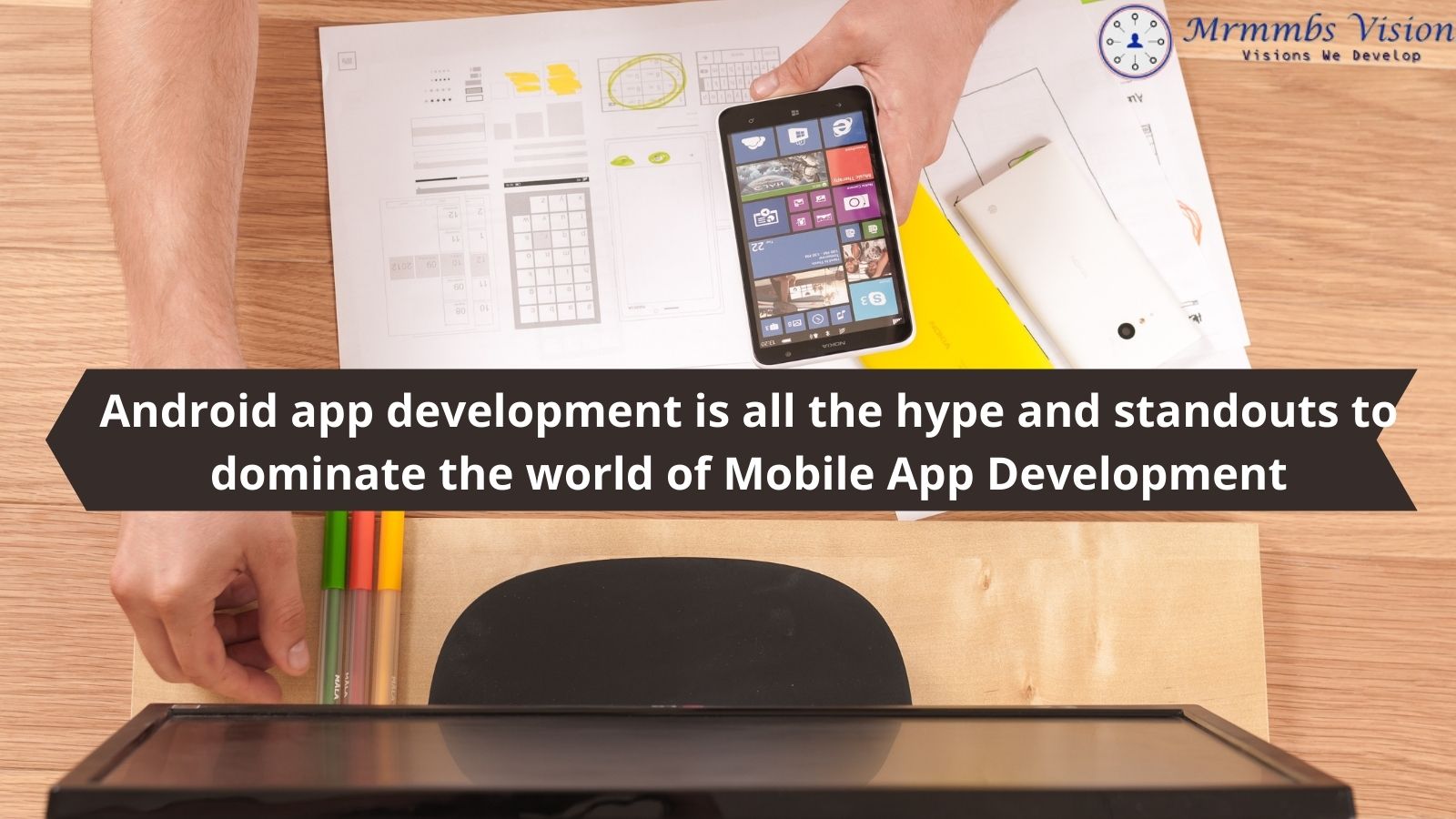
Cheat Sheet for Beginners: A Theory Guide to Android App Development
With the emergence of smartphones the usage of them has skyrocketed and has changed the way we consume content, process our daily life, do business, etc. Everything we do today is connected with the same like ordering food, taking a cab, finding a job, sending money, a source of entertainment, etc. With the evolution of smartphones and the emergence of applications on the go right now around 85% of smartphones run on the Android operating system making Google Play Store flooded with thousands of Android apps every single day.
The process of development in android is all the hype and standouts to dominate the world of mobile app development with fun projects, great pay, and tonnes of other work. In today’s tech-related world for business having an application is a boon but on the same hand developing one is a task. Hiring an Android App Development Company can be your go-to way to get the apps developed whereas driving yourself to learn about the development process of application you can also work on developing any app you want all by yourself.
About Android
Android is an open-source, Linux-based software used by Google to power around 2.5 billion devices all across the world which makes it the most popular operating system for mobile phones, apps, smartphones, and tablets, etc. It is considered one of the most used operating systems because it is portable, multi-user, and has the ability to handle complex tasks, and performs multitasking.
About Android App Development
Android app development refers to the process of creating an android operating system-based mobile application for your business. Android app development offers several tools, techniques, and softwares that act as a right hand in the development process of an application. The tools offered are Software Development Kit (SDK), Integrated Development Kit (IDK), and Java Software Development Kit (JDK).
Apart from tools, techniques, and software, Android offers a set of features as well like:
-
Widgets: Widgets are the features that provide access to the information on the screen at a glance.
-
Custom ROMs: Custom ROMs are the features that provide the benefit of customization as per the user’s interest. Using custom ROMs a user can set its operating system in a manner that suits the interest of the individual like different themes, features, widgets, motion, etc.
The development process of an Android application can be written in different programming languages and completely depends on the level of the skill set of the programmer and developer. The basic languages used to build an android mobile app are:
-
Java: Developed in the year 1991, acquired by Oracle Corporation Java is a simple, open-source, secure, and user-friendly programming language that makes writing, compiling, and debugging easy. It is widely used to create reusable code and modular programs that can be written once, and run anywhere.
-
Kotlin: Designed in 2011 by Jetbrains, Kotlin is a programming language that supports object-oriented and functional programming. It is considered the same as Java, C++, C, etc.
-
C++: Developed as an extension to C language C++ is a powerful cross-platform language used to create high-performance applications. C++ is widely used to develop browsers, 2D and 3D games, and so on.
-
JavaScript: Alongside HTML and CSS, JavaScript is a lightweight, object-oriented programming language in the world of the web that helps make web pages alive. JavaScript makes your site and project dynamic, it helps create website content that can move, refresh, or change without manually reloading the web page.
-
HTML: Abbreviation of HyperText Markup Language is a programming language used to create web pages and describe the structure of web pages. It creates the structure of a web page and its content.
Benefits of Android App Development
The different offerings are what make something a hot topic and simultaneously increase the demand for it. Similarly, in the case of android app development the robust features, functionality, offering, services, and benefits of Android app development make it the most used app development platform.
-
Open-source: Android being an open-source platform is what acts as a benefit in the field of android app development and is widely utilized by developers. As an open-source android offers freedom to manufacturers to access it easily and do the coding for free.
-
Wider audience reach: Android is marking its presence steadily across the demographic and geographical range of smartphone users. At present Android has a market share of around 70% that provides businesses a wider audience as compared to other platforms. With a 70% market share, it is always advised to develop an application for an android first than other platforms.
-
Easy integration: Another benefit that android provides is integration. If you are a business looking for integration then android is the best plan for you as it provides you the privilege of integration, tweak, and custom development of an app. Integration helps in improving the presence of the business, products, and services offered.
-
High rate of customization: In the field of customization android is considered to offer the easiest customization. It allows developers to tweak as per the requirements of businesses and deliver the best possible results.
-
Easy Adoption: Android is easy to adopt as it is well-scripted in Java and offers a rich set of libraries that can be used by developers. As per the developers, it is easy to develop an app with the knowledge of Java, it can easily transit the code script in mobile apps and others.

Process of Android App Development
The development process of an android application is a sum-mean of different stages involved in the development process of an Android application. The steps involved in the process include designing, creating, developing, and testing the app.
Step 1: Unique Ideation of an app
The first and most important stage in the process of android app development is the manifestation and conceptualization of the idea one wants to create. You can not have an app if you don’t have the idea, you need to develop an idea that is unique and true to its existence as it will add value to the app and the users using it post-development.
Step 2: Strategy Building
Strategy building in the process of Android app development means providing the structure to the ideation of the app. It consists of creating a plan after doing an adequate amount of research of the market, users, competitors, etc.
Step 3: Blueprint of the app
Wireframing or blueprint of the app is the process of providing the complete idea of the design of the app and its functionality. It includes the structure of the development process like features, layout, specifications, and others to help organize the app from the beginning to the end.
Step 4: App designing
After the process of ideation, strategy building, blueprint creation of an app the next step to success is designing the app. The design, UI/UX of the app is the first thing that a user will notice as soon as they open the site therefore it should be attractive enough. Without a proper user interface, app colors, spacing, images, text, and other noticeable features your application will not be a great hit on the Google Play Store.
Step 5: Development of the app
Once the designing part is ready it is the right time to get the app developed. You need developers working on the front-end of the app maintaining the user interface as well as developers who would work on the server-side of the app. The development of the app should be done in a manner that the application is speedy, stable, and delivers the best user experience when browsed.
Step 6: Testing
Once the app is developed, it is time to evaluate the loopholes, flaws, and bugs of the application by performing meticulous testing. The developers or the testers should test the app automatically and manually to detect the glitch and later on rectify it as per their suitability.
Step 7: Store submission
Store submission of an app is the green line to go ahead with the final development of the application and apply it for submission in the Google Play Store. The procedure of submitting an application involves providing screenshots of the app’s layout, its details, its problem-solving ability, and other features in the description box.
Step 8: Post-deployment
The process of post-deployment or maintenance constitutes 10% of the development whereas the development and other steps are 90% of the process. Maintenance of the app after its release is the main component as it helps meet the Android App Development Trends, makes the app error-free, and increases responsiveness.
Helpful Tools in the Process of Android App Development
To develop and deliver the most unique, responsive, and best out of the project a developer needs some useful tools. Here’s the list:
-
Android SDK: One of the major Android app development tools used by developers for developing a vast number of applications is Android SDK. The tool provides a vast number of features used to write, optimize, and test the building application.
Key Features: APIs compatibility, availability of offline maps, the option of debugging.
-
AVD Manager: A tool offered by Android Studio AVD manager is considered the most beneficial tool used to create emulations of android devices over a single computer. The emulator provides all different capabilities for android devices.
Key Features: Faster boot, Google play store utilization, CTS compatibility, etc.
-
Eclipse: Eclipse, an open-source extensible software development app framework that offers a different environment and tools to customize the development. Eclipse allows developers to write codes in different languages like Python, JavaScript, Ruby, and other different languages.
Key Features: Automatic error reporting, module distribution, and core language features, and others.
-
Android Studio: On the track of developing an android application the tool Android Studio is your best friend. Based on IntelliJ IDEA it is a tool that covers all your needs and acts as a development environment for Google’s operating system. The tools help edit, debug, and troubleshoot the developed project easily.
Key Features: C++ and NDK support, code editor, APK Analyzer, and fast emulator.
-
Unity 3D: A game development tool that provides the features to develop intensive and VR/AR games. Unity 3D is widely used to create 2D and 3D games with good performance, rendering solutions, and storytelling, and others.
Key Features: Cross-platform tool, easy social media integration, and unity cloud.
Posted By: Mrmmbs Vision